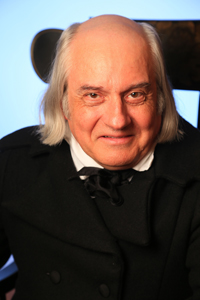Albert Gallatin
Longest Serving Secretary of the Treasury
by a Elaine Ackerson on January 21, 2018
Mr. Madison and Mr. Jenks have the honor of introducing Albert Gallatin, appointed in 1801 as Secretary of the Treasury by President Thomas Jefferson. In 1814, Mr. Gallatin resigned that post to become the de facto lead for the United States in the negotiations which brought an end to the War of 1812.

Albert Gallatin was born in 1761, in the city-state of Geneva, and was destined to help build a new, democratic nation over 3,000 miles from his birthplace.
Historians often refer to him as our "Swiss" Founding Father. However, this is a bit misleading as the Canton (city-state) of Geneva joined the Helvetic (Swiss) Confederation, some 35 years after Mr. Gallatin emigrated to America.
Mr. Gallatin began his political career as a legislator for the Commonwealth of Pennsylvania, and was sent to the new United States Congress as first a Senator and then a Congressman. His tenure as a United States Senator was short lived as he had not held citizenship the requisite six years at the time of his election.
In 1801, he was appointed by President Thomas Jefferson as the Fourth Secretary of the Treasury. During his tenure as the Secretary of the Treasury he set in motion methods that still apply to today's Federal Budget.
After fourteen years (the longest time the office has been held by a single person) Mr. Gallatin entered the diplomatic world, first participating in the negotiations to end the War of 1812 and then as Minister to France and Minister Plenipotentiary to the Court of St. James.
Retiring to private life, Mr. Gallatin went on to become involved in the academic world. As one of the founders of New York University, today he is honored to have the Gallatin School of Individualized Study named for him.
Many of his accomplishments during his long and varied career shaped the nation's fiscal policies and the academic world as we know them today.